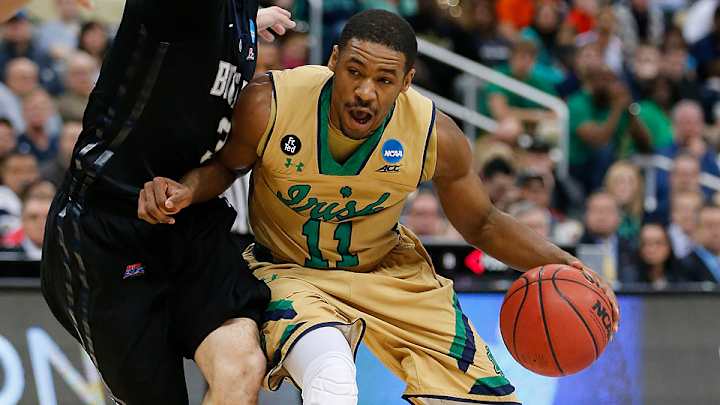Notre Dame overcomes adversity on, off court in OT win over Butler

PITTSBURGH—Time measurement is always a human construct, never more than in sports, where a game’s internal clock can halt itself wildly out of sync with the rest of reality’s. And so the final two seconds of regulation in Notre Dame’s 67-64 overtime win over Butler, with their three timeouts, out-of-bounds stoppage, officials’ review to restore six tenths of a second to the clock, and fruitless Bulldogs lob at the buzzer, passed as though they took far more than the mere minutes experienced by onlookers.
Junior Irish forward Zach Auguste said afterward that tiny snippet of game time felt like a whole game. The game's emotions would be placed in a much different context after its conclusion, when Notre Dame coach Mike Brey revealed that his mother had died that morning, news he had kept even from his players until the game had finished. But in that moment, Auguste felt the weight of uncertainty regarding not only the game's outcome but his role in determining it.
The score was tied in the final seconds when Auguste came down with a defensive rebound after Butler forward Roosevelt Jones’s floater fell short. With the ball secured, Auguste began bounding upcourt in hopes of launching a prayer as time expired. In his haste, however, Auguste double-dribbled while trying to avoid Bulldogs guard Alex Barlow, stopping the clock with two seconds left and giving Butler another try to win it.
“I knew,” Auguste said. “I messed up. I knew I did.”
He recalled all this with a smile because of what followed. Auguste spent the ensuing timeout huddle with his hands on his knees and jersey collar clenched tightly between his teeth, his back being patted by teammates Pat Connaughton and Jerian Grant, who told him to shake it off and move on to the next play. Auguste did, returning for two more plays in those final two seconds of action. On the first, Connaughton emphatically swatted Kellen Dunham’s corner three out of bounds, nearly stomping on the Butler cheerleaders along the baseline as he landed.
Officials put 0.6 seconds on the clock after the play, allowing the Bulldogs to try an unsuccessful lob to forward Kameron Woods, sending the game to overtime. The extra period granted Auguste relief in two doses: the assurance that the possession he handed Butler did not decide the game, and the Fighting Irish pulling ahead to win a tightly and emotionally played game to send the program to its first Sweet 16 in 13 seasons. Auguste did not score any of Notre Dame’s 12 overtime points—those went to Grant, Connaughton, and Steve Vasturia—but starred in its final seconds, grabbing a pair of defensive rebounds and swatting away a shot by Dunham that would have cut the lead to three with just under 12 seconds left.
When the final buzzer sounded, Auguste pointed to the sky and said a quick prayer before his teammates shared their congratulations, a ritual he usually saves until he has returned to the locker room.
“I thought it was necessary to do it then,” Auguste said. “I was just thankful, man.”
After the game, Auguste's emotions would seem small compared to Brey's press conference announcement that his mother, Betty had died of a heart attack that morning at age 84. He called the victory “a tribute to her” and described her as “probably the real driving force behind everything I've done.”
An Olympic swimmer in 1956, Betty Mullen Brey once set the world record in the 100M butterfly and later became the swimming coach at George Washington, from which Mike graduated in 1982. “She tried to make swimmers out of all of us,” Mike said after the win, referring to his brother and sister, who were in Orlando with Mike’s father, Paul. “I snuck out of practice when I was nine and she let me go to basketball camp. So that worked out real well.”
East region shakeup, Pac-12 surprise overshadow Kentucky—for a day
Brey will fly to Orlando to join his family before the start of the Midwest Regional, where his third-seeded Irish will meet either Kansas or Wichita State on Thursday. He recalled fondly to reporters how invested his mother was in his team’s success. “I’d talk to her during the season and very rarely did I get, ‘Hey, Mikey, how you doing?’” Brey said. “It’s like, ‘Have you got them ready? Are they ready? I think we can beat Duke, Mike.’”
Surely Betty would be smiling at this. Her son is back in the Sweet 16 for only the second time, doing so after a dismal 15-17 campaign last season, along with six losses in either Notre Dame’s first or second NCAA tournament game in the previous eight years. That he did so in the wake of losing a parent, and that he remained focused enough for his players to remain unaware throughout their preparation, is astounding. “It sure kept my mind off the game,” Brey said.
And he remained in high spirits as he recounted the victory to reporters outside the Notre Dame locker room in the wee hours of Sunday morning. The “magnificent college basketball game,” as Brey described it, included nine lead changes and a six-point Notre Dame deficit with less than 10 minutes remaining. With five double-digit comebacks under their belt this year, Brey thought it fitting they had to climb uphill once more.
“That was the script of the season,” he said.

Dan Greene is a writer and reporter for Sports Illustrated. He has been with the magazine since his internship in 2010. He lives in Brooklyn and primarily writes about college basketball.